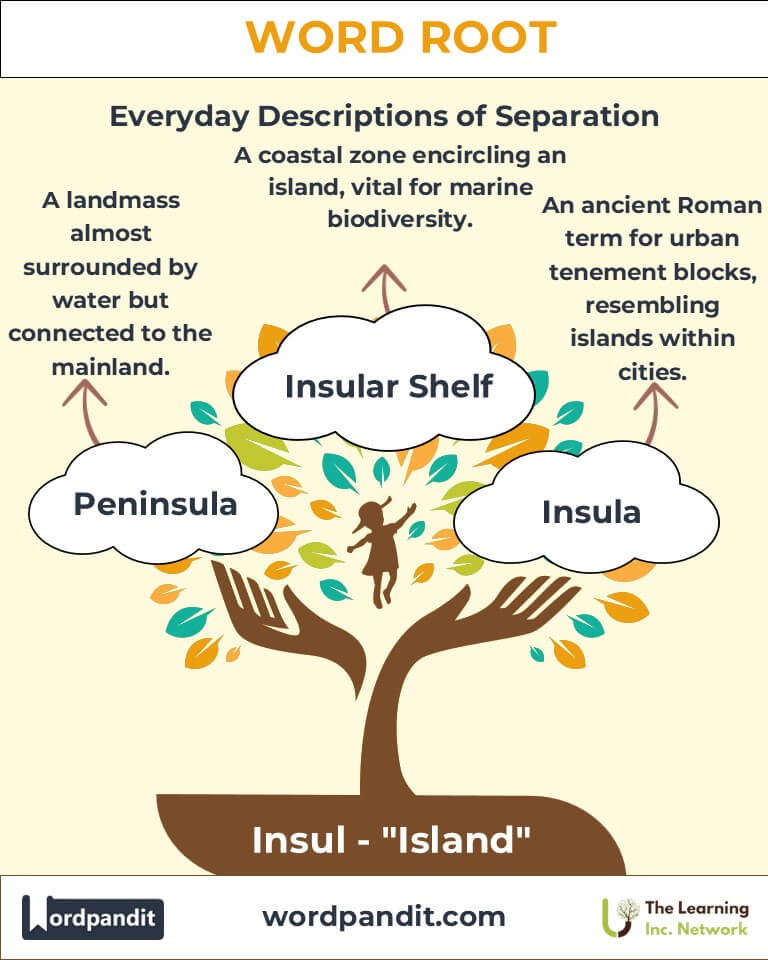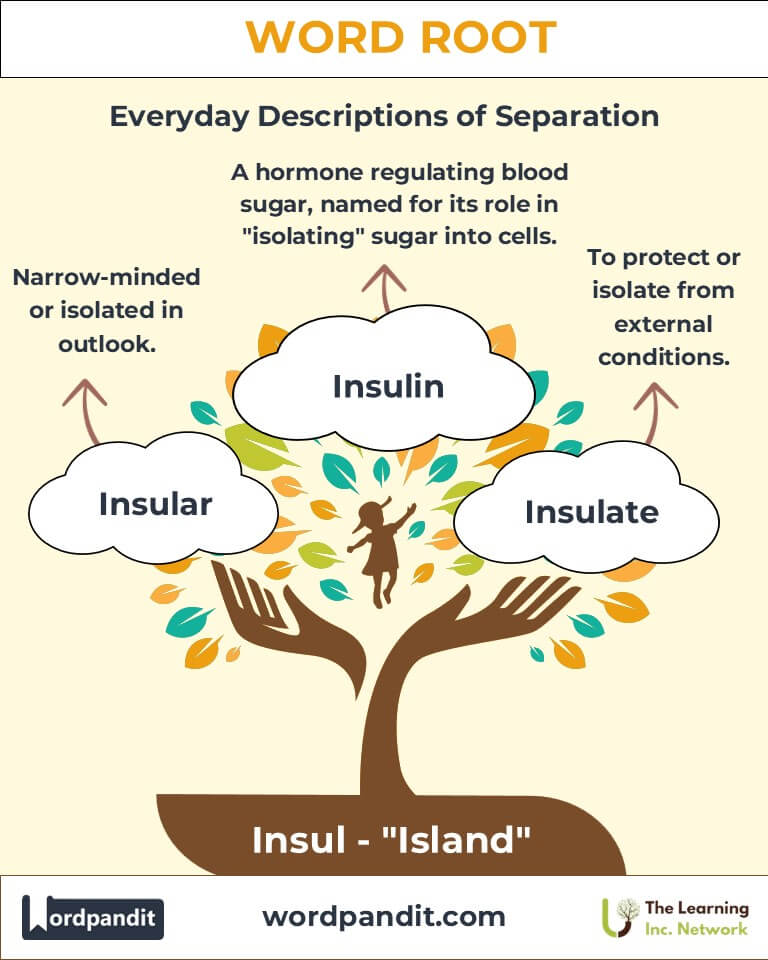Insul: Exploring the Roots of Isolation and Geography
Byline: Discover the depth and versatility of the word root "insul," derived from the Latin word insula, meaning "island." From geographical terms like "peninsula" to metaphors of isolation in "insular," this root encapsulates both the physical and metaphorical worlds of separation and self-containment.

Table of Contents
- Introduction: The Essence of Insul
- Etymology and Historical Journey
- Mnemonic: Unlocking the Power of Insul
- Common Insul-Related Terms
- Insul Through Time
- Insul in Specialized Fields
- Illustrative Story: Insul in Action
- Cultural Significance of the Insul Root
- The Insul Family Tree
- FAQs about the Insul Word Root
- Test Your Knowledge: Insul Mastery Quiz
- Conclusion: The Living Legacy of Insul
Introduction: The Essence of Insul
Picture a solitary island surrounded by vast waters. This image captures the heart of the Latin root insul, pronounced in-suhl, meaning "island." Beyond its geographical applications, this root forms the basis for terms that convey detachment, exclusivity, or independence. From physical landscapes to metaphorical mindsets, "insul" bridges the tangible and abstract realms.

Etymology and Historical Journey
The root insul originates from the Latin word insula, literally translating to "island." In ancient Roman times, insula referred not only to landmasses surrounded by water but also to densely populated urban blocks, symbolizing a microcosm of isolation amidst bustling cities. As Latin evolved into modern languages, insula gave rise to words like "peninsula" (paene insula or "almost an island") and "insular" (referring to narrow-mindedness, likened to being cut off on an island).
Mnemonic: Unlocking the Power of Insul
Visualize a solitary, palm-tree-laden island labeled "INSUL," representing isolation yet brimming with life. This imagery ties the root to both physical and metaphorical isolation.
Mnemonic: "INSUL—where solitude meets the shore."
Common Insul-Related Terms
- Insular (in-suh-ler):
- Definition: Narrow-minded or isolated in outlook.
- Example: "His insular attitude made it difficult to embrace diverse perspectives."
- Peninsula (puh-nin-suh-luh):
- Definition: A landmass almost surrounded by water but connected to the mainland.
- Example: "Florida, a peninsula, is bordered by the Gulf of Mexico and the Atlantic Ocean."
- Insulate (in-suh-late):
- Definition: To protect or isolate.
- Example: "The thick walls insulate the house from extreme weather."
- Insulin (in-suh-lin):
- Definition: A hormone regulating blood sugar, named metaphorically for its role in "isolating" sugar into cells.
- Example: "Patients with diabetes often rely on insulin injections."
- Insularity (in-suh-lar-i-tee):
- Definition: The state of being isolated or detached.
- Example: "The village’s insularity preserved its unique culture for centuries."
Insul Through Time
- Insular: Initially a neutral descriptor for islands in the 16th century, "insular" acquired a metaphorical meaning in the 1600s, referring to isolationist attitudes.
- Peninsula: Derived from paene insula (Medieval Latin), meaning "almost an island," it entered common use to describe landforms like Italy and Spain.
Insul in Specialized Fields
- Medicine:
- Term: Insulin
- Relevance: Vital in endocrinology, insulin metaphorically isolates glucose for energy production.
- Geography:
- Term: Insular Shelves
- Definition: Coastal zones encircling islands, vital for marine biodiversity.
- Architecture:
- Term: Insula
- Definition: In ancient Rome, this term described urban tenement blocks, central to studying ancient city planning.
Illustrative Story: Insul in Action
On a remote peninsula, a young cartographer named Elena discovered a series of insular communities living in harmony with nature. Despite their geographical isolation, their culture thrived, rich with traditions and ecological wisdom. Inspired, Elena devised maps connecting these communities, transforming their insularity into a network of shared resources and ideas. Her story exemplifies how "insul" balances isolation with connection.
Cultural Significance of the Insul Root
"Insul" underscores themes of separation and self-reliance in literature and culture. For instance, Shakespeare’s The Tempest unfolds on an isolated island, exploring themes of power and solitude. In modern discourse, insularity critiques the challenges of globalization, advocating for open-mindedness and integration.

The Insul Family Tree
- Isl-/Isle (Old French):
- Example: "Island" (a direct descendant of insula).
- Insidio (Latin, "ambush"):
- Example: "Insidious" (metaphorically creeping, like isolation's subtle effects).
- Paene (Latin, "almost"):
- Example: "Peninsula" (land that is almost an island).

FAQs About the Insul Word Root
Q: What does "insul" mean?
A: "Insul" means "island," originating from the Latin word insula. This root captures both the physical concept of land surrounded by water and metaphorical notions of isolation or self-containment. It appears in terms like "insular" (narrow-minded or detached) and "peninsula" (a landform nearly surrounded by water).
Q: Why does "insular" refer to narrow-mindedness?
A: The metaphorical use of "insular" stems from the isolation of an island. Just as an island is physically cut off from the mainland, an insular person is metaphorically cut off from diverse ideas or influences, resulting in a limited or narrow perspective.
Q: How is "peninsula" related to "insul"?
A: "Peninsula" comes from the Latin phrase paene insula, meaning "almost an island." It describes a landform that is mostly surrounded by water but still connected to the mainland, such as the Florida Peninsula or the Italian Peninsula.
Q: What does "insulate" have to do with "insul"?
A: "Insulate" derives from the root insula and metaphorically means "to create an island." In practical terms, insulating something protects or isolates it from external conditions, like insulating a house to keep it warm or insulating wires to prevent electrical shocks.
Q: What is the origin of "insulin," and how does it connect to "insul"?
A: The hormone "insulin" is derived from the Latin word insula because it was first identified in the Islets of Langerhans, clusters of cells in the pancreas. The name reflects the physical isolation of these cells, much like tiny islands within the pancreas.
Q: Why is "insula" used in ancient Roman architecture?
A: In ancient Rome, insula referred to densely packed apartment blocks, resembling islands amidst the bustling urban environment. This term highlighted the self-contained nature of these buildings, much like literal islands.
Test Your Knowledge: Insul Mastery Quiz
1. What does "insul" mean?
2. Which term means "almost an island"?
3. What does "insular" metaphorically describe?
4. What is the medical relevance of "insul"?
5. What is the origin of "insulate"?
Conclusion: The Living Legacy of Insul
The root "insul" symbolizes isolation and connection, whether through geographical landforms or metaphorical detachment. Its presence in terms like "insular" and "peninsula" reflects its enduring relevance in our language and culture. As we explore the world, both literally and figuratively, "insul" reminds us of the delicate balance between solitude and community, encouraging us to bridge divides and embrace interconnectedness.












